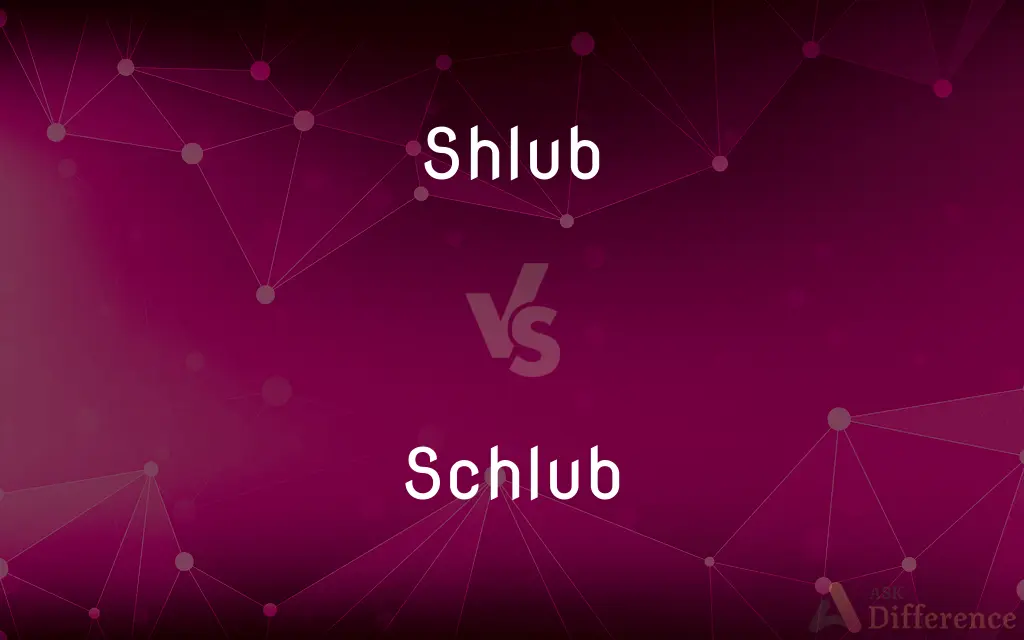Shlub vs. Schlub — What's the Difference?
By Fiza Rafique & Urooj Arif — Updated on April 24, 2024
"Shlub" and "schlub" are variant spellings of the same term, both referring to a person who is slovenly or lacks style, though "schlub" is the more commonly accepted spelling.

Difference Between Shlub and Schlub
Table of Contents
ADVERTISEMENT
Key Differences
"Shlub" and "schlub" are informal terms used to describe someone perceived as ungainly, poorly dressed, or lacking sophistication. On the other hand, "schlub" is more frequently seen in written English, suggesting a standardization of the spelling in contemporary usage.
Both terms connote a certain clumsiness or unrefined nature in a person's demeanor or appearance. Whereas, the pronunciation and usage of "schlub" align with its Yiddish roots, which imbues the term with a cultural specificity that "shlub" may sometimes lack due to its less common usage.
In popular culture, characters described as a "shlub" or a "schlub" often provide comic relief or serve as contrast to more polished characters. Meanwhile, the use of "schlub" tends to appear more in dialogues and texts where a vernacular, colloquial feel is desired.
While "shlub" might appear in less formal or less edited text, "schlub" is endorsed by more dictionaries, indicating a preference in edited and published materials. This difference highlights the fluid nature of informal language and its impact on spelling variations over time.
Though similar, each term's appearance in written and spoken language can influence perceptions of its correctness. "Schlub" is more likely to be recognized and understood correctly, which can affect a writer’s or speaker's choice in different contexts.
ADVERTISEMENT
Comparison Chart
Common Usage
Less common spelling
More commonly accepted spelling
Language Origin
Variant of Yiddish term
Directly derived from Yiddish
Cultural Association
May lack some cultural nuances
Strong Yiddish cultural nuances
Presence in Media
Less frequent
More frequent
Dictionary Recognition
Less commonly recognized
More commonly recognized
Compare with Definitions
Shlub
A clumsy, inept, or unattractive person.
He dressed like a shlub in mismatched clothes.
Schlub
Used to describe someone with poor social skills.
At parties, he’s known as the schlub who can't make small talk.
Shlub
Someone lacking style or good manners.
Despite his success, he still acts like a shlub.
Schlub
A person who is clumsy, sloppy, or unfashionable.
He’s a sweet guy, but a bit of a schlub in his old sweatpants.
Shlub
Often used humorously to describe a harmless, unremarkable person.
He’s a shlub but he's our shlub.
Schlub
A term of mild derision or endearment for an ineffectual person.
Oh, don’t be such a schlub—just ask her out!
Shlub
A person regarded as dull or uninteresting.
Nobody wanted to partner with the shlub of the class.
Schlub
In media, a character type that is often the underdog or the everyman.
In the movie, the schlub ends up winning everyone's hearts.
Shlub
Informal: a term used for an insignificant or pitiable person.
He’s just a shlub, don’t worry about what he thinks.
Schlub
Someone not polished or sophisticated.
She’s brilliant at work, though somewhat of a schlub socially.
Shlub
Variant of schlub.
Schlub
A talentless, unattractive, or boorish person
The poor dumb shlub just didn't get it
Shlub
Alternative spelling of schlub
Schlub
A person regarded as clumsy, stupid, or unattractive.
Schlub
A person who is clumsy, oafish, or socially awkward, or unattractive or unkempt.
Common Curiosities
How should I use "schlub" in a sentence?
"Schlub" is best used informally to describe someone who is somewhat awkward, slovenly, or unpolished.
Why are there two spellings for "schlub"?
Variations like "shlub" arise from phonetic interpretations of spoken language, common with terms of Yiddish origin.
Can "schlub" have positive connotations?
Typically, "schlub" has negative connotations, but it can be used affectionately to describe someone's endearing quirks.
Is it offensive to call someone a "schlub"?
It can be seen as derogatory, depending on context and tone, though it is often used in a light-hearted or humorous manner.
Does "schlub" refer only to men?
While often used to describe men, "schlub" can apply to any gender.
Is "shlub" just a misspelling of "schlub"?
"Shlub" is an alternative spelling of "schlub," not strictly a misspelling, but "schlub" is the more standard form.
Do "shlub" and "schlub" appear in literature?
"Schlub" appears occasionally, especially in works that reflect everyday speech or explore cultural identities.
How can I avoid being a "schlub"?
Paying attention to personal grooming, dressing appropriately, and practicing social etiquette can help avoid the "schlub" label.
Are there similar words to "schlub" in other languages?
Many languages have similar informal terms for an inelegant or clumsy person, though each carries its own cultural nuances.
What is the origin of "schlub"?
"Schlub" comes from the Yiddish "zhlob" or "zhlub," meaning a clumsy person or oaf.
Is "schlub" recognized in formal writing?
"Schlub" appears in informal contexts; it's less likely to be used in formal writing unless quoting speech.
What can someone learn from being labeled a "schlub"?
It might highlight areas for personal improvement, such as social skills or personal care.
Can "schlub" be a term of endearment?
Yes, among friends or in familiar company, it can be used affectionately to tease or show familiarity.
How is "schlub" perceived in different social settings?
In casual settings, it's often humorous; in more formal or sensitive environments, it might be viewed as rude.
What does it imply about someone's personality if they're called a "schlub"?
It suggests they might be socially awkward, unrefined, or lack concern for appearances.
Share Your Discovery

Previous Comparison
Canoe vs. Rowboat
Next Comparison
Bake vs. RoastAuthor Spotlight
Written by
Fiza RafiqueFiza Rafique is a skilled content writer at AskDifference.com, where she meticulously refines and enhances written pieces. Drawing from her vast editorial expertise, Fiza ensures clarity, accuracy, and precision in every article. Passionate about language, she continually seeks to elevate the quality of content for readers worldwide.
Co-written by
Urooj ArifUrooj is a skilled content writer at Ask Difference, known for her exceptional ability to simplify complex topics into engaging and informative content. With a passion for research and a flair for clear, concise writing, she consistently delivers articles that resonate with our diverse audience.
















































